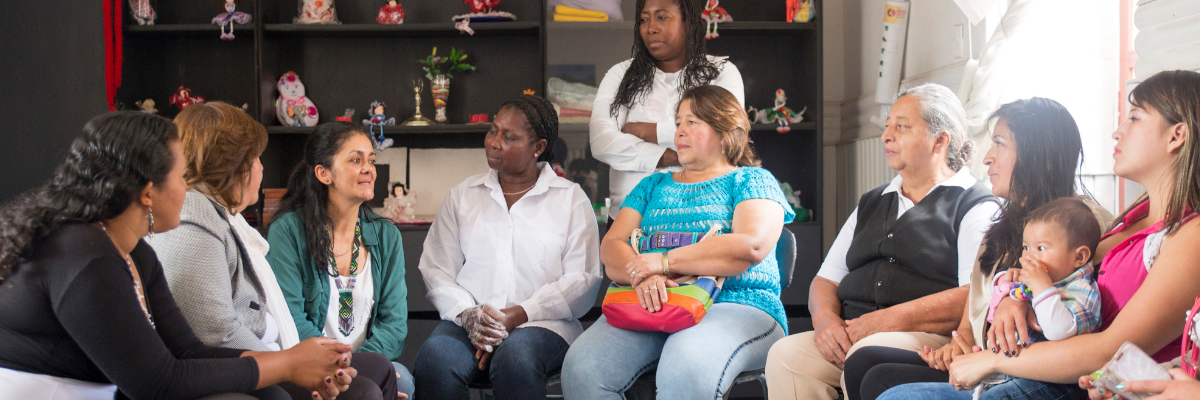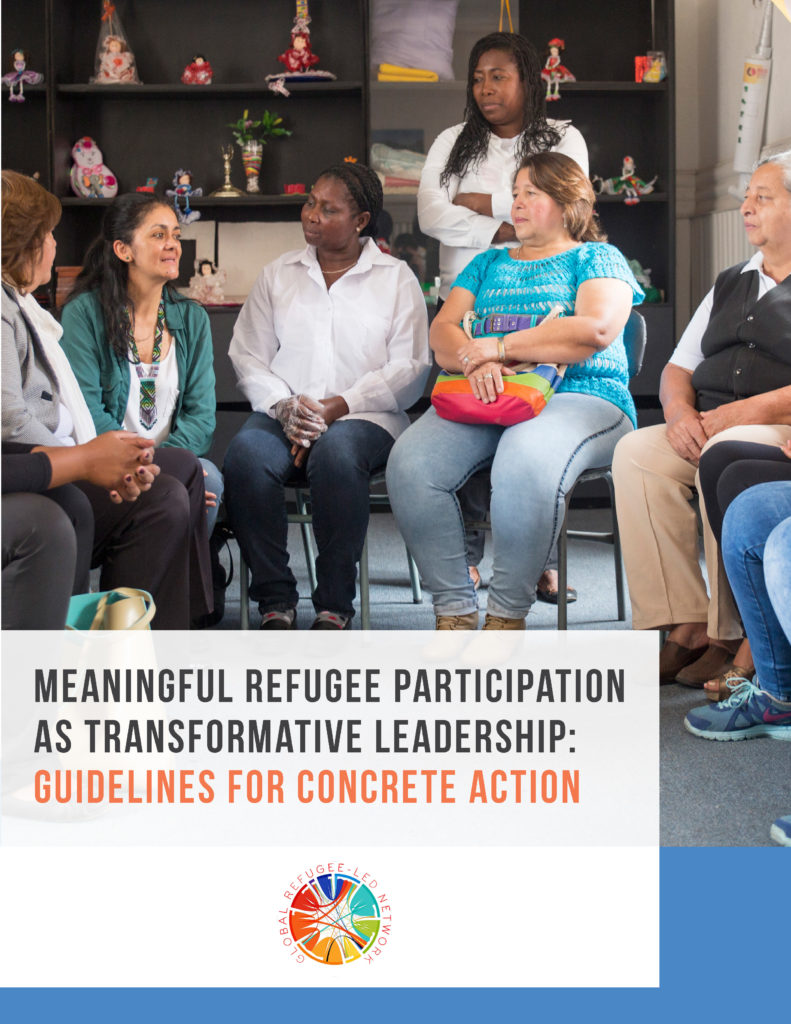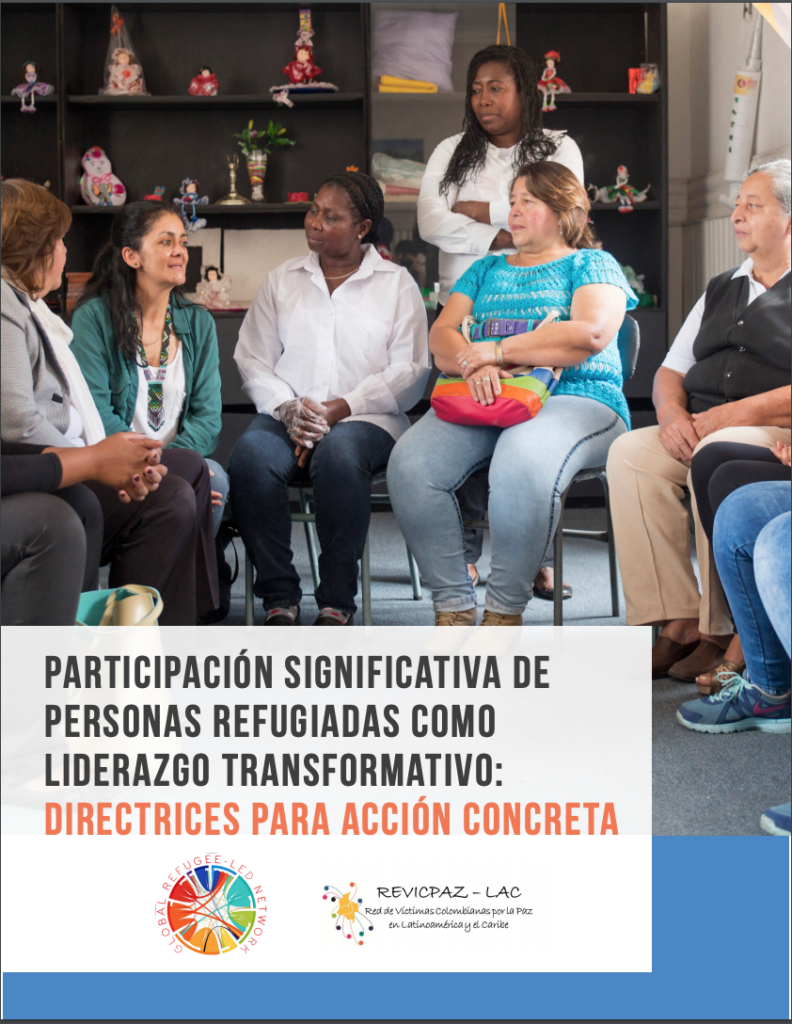Survivors who have experienced forced displacement must lead at all levels of refugee response.

MEANINGFUL PARTICIPATION
Many working in the refugee response sector would intuitively understand that a women’s rights conference led by men is destined to be ineffective. Responders would likely question the validity of a straight, cisgender person as the spokesperson for an LGBTIQ+ rights organization, and critique a panel on indigenous rights with no indigenous panel members.
However, within the refugee response sector, refugees are rarely present at sites of decision-making or even discussion. At large refugee rights conferences, one could count the number of refugee representatives on one hand, and at the smaller tables where big decisions happen, refugees are wholly excluded. They are also largely absent from the ranks of refugee response institutions.
What can we do to address this?
To work towards addressing this problem, the Global Refugee-led Network in collaboration with Asylum Access published a document that contains a definition of ‘meaningful participation’ and guidelines that would enable meaningful participation specifically within the refugee response sector.
The Meaningful Participation Guidelines include the following recommendations:
- Facilitate ongoing and sustained access to strategizing and decision-making processes at every level.
- Facilitate refugee preparedness to engage in strategizing and decision-making moments.
- Initiate institutional self-reflection and enact changes that dismantle power dynamics.
- Finance refugee participation and refugee-led initiatives.
- Address and prevent tokenizing refugees.
Change in any form is not easy; but, change of this kind is highly complex. Research shows that change of this magnitude is only possible when leaders commit to systemic transformation, and accordingly allocate the time and financial resources necessary to instigate change. Ultimately, we must make this transition; until refugees themselves are leading refugee responses at local, national and global levels, status quo and ineffective responses are unlikely to be fully examined and reformed.
Access the Meaningful Participation Guidelines below
We would like to thank the Network of Colombian Victims for Peace in Latin America and the Caribbean (REVICPAZ-LAC) for their collaboration to produce the Spanish version of the guidelines.
Our commitment to refugee leadership and participation
Asylum Access’s commitment to refugee leadership and participation is core to who we are as an organization. We believe that movements are most impactful when they are led by those most affected.
The global refugee response space has been talking about the importance of including refugees in responding to refugee situations for more than a decade. Most recently, both the 2016 New York Declaration and the 2018 Global Compact on Refugees have called for meaningful participation of refugees in refugee response. Importantly, there is a growing appreciation for the fact that including refugees in substantive ways is not only the right thing to do, but that it results in policies and programs that are more effective and legitimate. Despite this progress, the refugee response sector is struggling to meaningfully include refugees and their local host communities.
Asylum Access — alongside many partners around the world — is changing this.
At the historic Global Refugee Forum in 2019, Asylum Access made specific pledges aimed at increasing refugee leadership and participation. Since that time, we have expanded and developed these commitments so that they may push us, and others, to better embrace refugee leadership.
We are sharing our commitments to not only hold ourselves accountable but to also hopefully inspire other similarly positioned organizations to do the same.
Internal Efforts
We know that true transformation needs to start from within.
Representation
Asylum Access has committed to becoming more representative of the communities we work and live with. Specifically, our Global Leadership Team has committed to transforming its composition so that, by 2024, at least 40% of its members have lived experience of forced displacement, and the Board has also committed to transforming its composition so that, by 2026, at least 60% of its members have lived experience of forced displacement. To that end, we’ve dedicated financial and human resources to increase the number of staff and board who represent these communities. Recent hires and board candidates reflect the first step in this ongoing commitment.
Inclusion and Belonging
We recognize the importance of creating an inclusive environment so that all members of our team can feel that they belong and can meaningfully contribute to our mission. To that end, we dedicated resources to collaborate with CulturGrit, LLC to build Cultural Intelligence and Diversity, Equity and Inclusion (DEI) capacity in our leadership and operations, including our hiring, onboarding and professional development practices, our approach to external partnerships, and our communication practices.
Together with CulturGrit, we are overhauling our organizational voice to ensure that any messaging we do is centering and respecting the dignity, value, and agency of people affected by forced displacement. We have also strengthened our media consent practices so that clients who are willing to share their story with us have the power to make a full and informed choice over how it may be used in our communications.
The individual and collective learning has been tremendous, and we recognize that this journey is long and ongoing. We are committed to continue engaging our DEI consultant, and we have earmarked resources for each individual national organization to hire a local consultant so that their DEI journey is also culturally intelligent and meets the needs of the local environment. We want DEI to become part of our organizational DNA.
External Efforts
Asylum Access carefully builds partnerships with local organizations that are equitable, transparent, and sensitive to power dynamics. We are careful to not “gatekeep,” meaning we will not stand in the way of direct relationships between local actors and donors, policymakers and other influential actors. These principles are enshrined in our Building Equitable Partnerships Position Paper.
Partnering with Refugee and Civil Society Leaders
We want to share as much of our policy change advocacy experience as possible with refugee leaders so that they are well-positioned to do the same and more in their contexts.
We form equitable coalitions with refugee-led and host community-led organizations in order to jointly secure funding and expand their legal empowerment and advocacy programs.
We also hold comprehensive advocacy training workshops twice a year in English and Spanish, which are tailored toward and open to any and all refugee-led organizations around the world. Additionally, we have committed to support at least four refugee-led organizations directly by 2023 with pro-bono consulting to support their advocacy skills development and positioning.
Financing Refugee-led Initiatives
Finally, we understand that internal transformation and joint advocacy efforts alone cannot bring about equity within the refugee response sector without refugee-led initiatives having equal access to funding.
In 2020, we spearheaded the #RefugeesLead campaign, a first-of-its-kind crowdfunding initiative to direct funds directly to impactful refugee-led organizations around the world.
Building on that principle, we convened five refugee-led organizations to form the Resourcing Refugee Leadership Initiative. This initiative’s objective is to establish the very first refugee-led global fund catered to finance refugee-led organizations – putting power and resources back into the hands of refugees themselves. Read more about this initiative below.
Resourcing Refugee Leadership Initiative
It has been shown time and time again that refugee-led organizations are often best-positioned to respond to the needs and interests of refugee communities due to their proximity and first-hand experience. And yet, right now, less than 0.05% of humanitarian funding worldwide is given to refugee-led organizations. This initiative was created to change this.
The Resourcing Refugee Leadership Initiative is a coalition of five refugee-led organizations together with Asylum Access as a convenor and advocacy partner. The five refugee-led coalition partners are Basmeh & Zeitooneh in Iraq and Lebanon, RAIC in Indonesia, RefugiadosUnidos in Colombia, St Andrew’s Refugee Services in Egypt, and YARID in Uganda. Together with Asylum Access, our collective expertise spans 11 countries and a wide range of programming aimed at supporting refugees.
The objectives of this coalition are:
- Establish the very first global fund for refugee-led initiatives, which will be managed by the refugee-led coalition partners.
- Support refugee-led organizations to strengthen their capacity with resources from the fund.
- Employ the fund as a vehicle to build strong connections between refugee-led organizations, influential bodies and donors.
This initiative has the potential to revolutionize how we respond to forced displacement by transferring power, ownership and resources over to refugees themselves. With adequate investment, dozens of refugee-led organizations can scale their operations and positively impact over 1,000,000 refugees worldwide.
View the two-page summary of the Resourcing Refugee Leadership Initiative.
This initiative has since been selected as one of five finalists for the Larsen Lam ICONIQ Impact Award.


